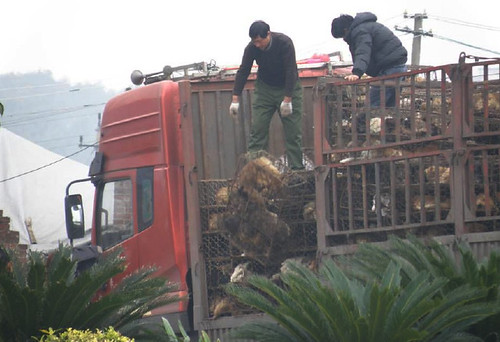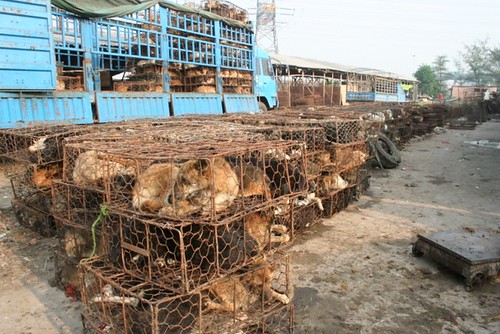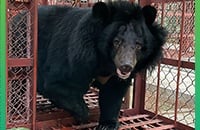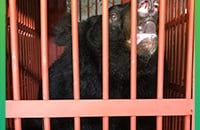SPECIAL REPORT: How theft of a blind man’s dog is helping China see its dog theft problem
04 March 2016
When a seeing dog was stolen from a blind man in China it made international headlines but millions more - stolen each year by the dog meat trade - are less high profile.
One such victim was “Uncle Deng” who lives in a village outside Guangzhou. He was devastated after his beloved dog Lao Hei was stolen in February this year. Their son, like so many sons in China, moved hundreds of miles away to work. Like most Chinese families - in accordance with the law they had only one child. They bought Lao Hei and joked he had become their son.
When they reported the loss to the police - they were able to access CCTV footage which showed that Lao Hei was grabbed by a “steel fork” from a passing van. Despite repeated visits to dog meat traders they never found their dog. They bought a new “golden” son - they couldn’t face buying another black dog. Nothing could replace their loss. Even the village became tainted in their eyes and they moved shortly afterwards.
These stories can be seen frequently in the Chinese press. The anger voiced about the theft of the “seeing eye” dog has prompted much debate about this ongoing issue. While the blind man’s dog was returned with an apology note. Most owners are not so lucky.
In China it’s estimated that 10m dogs are eaten every year. It’s a trade that is shrouded in cruelty and criminality. All but a tiny percentage of these dogs are stolen from animal lovers like Uncle Deng. In four years spent putting together research on the dog meat industry - Animals Asia could find no evidence of significant-sized dog farms.
In June 2015 Animals Asia reported:
“Media reports estimate up to 10 million dogs are slaughtered annually for meat in China, yet not a single farm visited during our investigation showed evidence of large-scale breeding facilities, where 100-plus dogs were bred and raised.
An anonymous worker at Fankuai Dog Meat Products told investigators:
“There were large breeding farms, but not any more, they couldn’t carry on. We also had one of our own before, but we found that the bigger it grew, the more diseases the dogs had, plus the costs were very high. The price of raising the dogs is higher than the market price of dog meat.”
Putting aside the cruelty to dogs - the scale of human heartbreak is so large that dog lovers continue to hope for change. Ironically the fear of vigilante violence against the dog thieves themselves may be the best hope for new legislation. In China and over the border in Vietnam - villagers have taken the law into their own hands.
“These tales of vengeance have become a fixture in Vietnam's state-run press...the number of attacks is likely underreported.
“Thanks to villagers with camera phones, many beatings are well documented on YouTube. Some mobs tied up thieves and draped them with signs reading ‘I'm a dog thief! Please punch me’."
“Less lucky are the men tortured with their own tasers. Or kicked so hard they never wake up.
“‘We love our dogs,’ says Nguyen Van Thiet, 72, a Nhi Trung war veteran who joined in on the killings. ‘Who's the first to welcome you home each day? It's not your kids. It's certainly not your wife. It's your dog.’”
Meanwhile in recent months in China, dog thefts continue to be reported. Within the space of a couple of months - over 50 burglary cases targeting dogs kept indoors happened in several villages on the outskirts of Beijing. The dogs were taken alongside more often burgled items like TVs and laptops.
While this was unfolding, Chinese media reported another tragedy - a seven-months pregnant woman was killed by a poison dart. The killer admitted it was her dog that he was aiming for. Meanwhile dog eaters continue to consume animals - many containing poisons including cyanide.
Such is the hopelessness felt by dog owners that most Chinese people see little benefit in reporting dog thefts.
At Animals Asia’s sanctuary in Chengdu, China - numerous dogs have gone missing. When “Bug" (pictured below) disappeared, Animals Asia founder and CEO Jill Robinson blogged:
“...even her kennel ‘safely’ next to our security hut couldn't save her from being snatched by an opportunist dog meat trader who had clearly known the routine of her owners, and seized his chance as she was taken for a walk.
“This same week, another resident said that her dog has gone missing too - and once again a shroud of sadness hangs over our village as we acknowledge that we will never see these happy, friendly dogs again.”

One neighbor even told Animals Asia staff of being threatened with death by knife-wielding thieves if she didn’t let them take her dog.
Later the Animals Asia team would hang banners around the sanctuary for local villagers to read - urging them not to accept dog and cat theft and to alert the police. Millions of stolen dogs go unreported and their disappearance is subsequently invisible. Meanwhile China’s animal lovers continue to mourn lost loved ones.

Jill Robinson’s blog post continued:
“With increasingly more people in China turning their backs on the consumption of dogs (and cats), the authorities of the town where a large dog and lychee Festival is held during the summer solstice each year are also stepping back from supporting such an event. Now prohibiting officials from attending, and preventing restaurants from advertising dog meat in Yulin, they are amongst a growing number of officials seriously concerned not only with the stories of theft, but with the cross border transport of caged and sick dogs that clearly adds to the threat of rabies and other diseases in China today.

Animals Asia Cat and Dog Welfare Director Irene Feng said:
“The dog industry is one that touches on all areas of criminality. The theft and murder of what are essentially family members. The owners who, quite literally, get caught in the crossfire. The dog meat eaters who are at risk from poisons and the poor hygiene that comes from thousands of dogs, many dying of disease, being trafficked many thousands of miles to meat dealers.
“Dog meat is eaten for reasons of superstition not for protein. It is not eaten out of poverty. Millions of people already have dogs as companions and farming dogs is difficult and expensive. While there is a market for dog meat that temptation to steal will always be there. For all these reasons, this is not an industry that needs to be regulated - it is an industry that needs to end.”
Read more about Animals Asia’s cat and dog welfare work.
BACK









 Freedom after two decades: Moon bears Nang and Mua rescued
Freedom after two decades: Moon bears Nang and Mua rescued
 With heavy hearts we say goodbye to our beloved Tulip
With heavy hearts we say goodbye to our beloved Tulip
 Three moon bears rescued from notorious bear bile farming hotspots in Vietnam
Three moon bears rescued from notorious bear bile farming hotspots in Vietnam